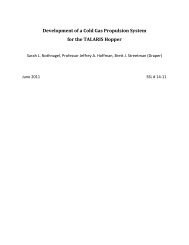- Page 1: Dynamic Tailoring and Tuning for Sp
- Page 4 and 5: Acknowledgments This work was suppo
- Page 6 and 7: 3.2 RPT Formulation . . . . . . . .
- Page 9 and 10: List of Figures 1-1 Timeline of Ori
- Page 11 and 12: List of Tables 1.1 Effect of simula
- Page 13 and 14: Nomenclature Abbreviations ACS atti
- Page 15: dk optimization search direction f
- Page 18 and 19: 1.1 Space-Based Interferometry NASA
- Page 20 and 21: unfettered by the Earth’s atmosph
- Page 22 and 23: the SCI, both the size and flexibil
- Page 24 and 25: maybethatitbecomescertain that the
- Page 26 and 27: Table 1.1: Effect of simulation res
- Page 30 and 31: has been found that structural desi
- Page 32 and 33: precision telescope structure for m
- Page 34 and 35: attractive, and more conservative a
- Page 36 and 37: to solve the performance tailoring
- Page 39 and 40: Chapter 2 Performance Tailoring A c
- Page 41 and 42: ometer (SCI). In the following sect
- Page 43 and 44: The equations of motion of the unda
- Page 45 and 46: The frequency response functions fr
- Page 47 and 48: the output covariance matrix, Σz,
- Page 49 and 50: where the subscript indicates the i
- Page 51 and 52: 2.3.3 Design Variables The choice o
- Page 53 and 54: and then, by inspection, the inerti
- Page 55 and 56: algorithms begin at an initial gues
- Page 57 and 58: at least locally optimal, and the s
- Page 59 and 60: initial design variable state, x =
- Page 61 and 62: and the RMS OPD is computed using E
- Page 63 and 64: # Designs 25 20 15 10 5 Accepted, b
- Page 65 and 66: does not provide information on why
- Page 67 and 68: energy is distributed almost evenly
- Page 69 and 70: also symmetric as seen in the figur
- Page 71 and 72: Chapter 3 Robust Performance Tailor
- Page 73 and 74: through careful and experienced mod
- Page 75 and 76: described above. However, one can r
- Page 77 and 78: ic, σz(�x, �p), that is depend
- Page 79 and 80:
Magnitude, OPD/F x [µm/N] Magnitud
- Page 81 and 82:
% Energy 100 90 80 70 60 50 40 30 2
- Page 83 and 84:
metric to the cost function. Note,
- Page 85 and 86:
tion: ∂hi (z,�x, �pi) ∂�x
- Page 87 and 88:
values are chosen from their statis
- Page 89 and 90:
Table 3.3: Algorithm performance: a
- Page 91 and 92:
Statistical Robustness The statisti
- Page 93 and 94:
Performance [µm] 1400 1200 1000 80
- Page 95 and 96:
(Figure 3-6(b)). The nominal perfor
- Page 97 and 98:
Norm. Cum. Var. [µm 2 ] PSD [µm 2
- Page 99 and 100:
energy by mode for easy comparison.
- Page 101 and 102:
Y−coordinate [m] Y−coordinate [
- Page 103 and 104:
RMS performance, [µm] 400 350 300
- Page 105 and 106:
The requirement chosen here is some
- Page 107 and 108:
Chapter 4 Dynamic Tuning Robust Per
- Page 109 and 110:
on a physical truss. Since tailorin
- Page 111 and 112:
Table 4.1: Tuning parameters for SC
- Page 113 and 114:
m 2 [kg] J ∗ # # time y ∗ [kg]
- Page 115 and 116:
m 2 [kg] 800 700 600 500 400 300 20
- Page 117 and 118:
configuration than the untuned, but
- Page 119 and 120:
Norm. Cum. Var. [µm 2 ] PSD [µm 2
- Page 121 and 122:
Performance Requirement [µm] 400 3
- Page 123 and 124:
is considered. 4.2.1 Hardware-only
- Page 125 and 126:
and added to the objective function
- Page 127 and 128:
using either a decreasing step-size
- Page 129 and 130:
for tailoring, but tuning parameter
- Page 131 and 132:
tained by randomly choosing paramet
- Page 133 and 134:
p [GPa] y ∗ [kg] Performance [µm
- Page 135 and 136:
# Func. Evals Performance RMS (µm)
- Page 137 and 138:
tion changes in the updated solutio
- Page 139 and 140:
Data: initial iterate, p0, performa
- Page 141 and 142:
the new tuning configuration is ver
- Page 143 and 144:
Performing an AO tuning optimizatio
- Page 145 and 146:
Uncertainty Bounds Test �y [kg] S
- Page 147 and 148:
Table 4.6: Tuning results on fifty
- Page 149 and 150:
eters are discussed. The optimizati
- Page 151 and 152:
Chapter 5 Robust Performance Tailor
- Page 153 and 154:
MPC optimization by allowing a diff
- Page 155 and 156:
where the notation yij indicates th
- Page 157 and 158:
(Table 4.1), and the uncertainty pa
- Page 159 and 160:
Table 5.2: Performance and design p
- Page 161 and 162:
it in the worst-case uncertainty re
- Page 163 and 164:
The data in Figure 5-2 indicate tha
- Page 165 and 166:
configuration. The tuned configurat
- Page 167 and 168:
same requirement. The effect become
- Page 169 and 170:
indicating that this requirement is
- Page 171 and 172:
E 2 [Pa] 7.8 7.6 7.4 7.2 7 6.8 6.6
- Page 173 and 174:
than the RPT design, 155.45µm to 5
- Page 175 and 176:
have a very small nominal performan
- Page 177 and 178:
of these simulations fail to meet r
- Page 179 and 180:
and that it is the only design meth
- Page 181 and 182:
Chapter 6 Focus Application: Struct
- Page 183 and 184:
optical path differences between th
- Page 185 and 186:
Table 6.1: RWA disturbance model pa
- Page 187 and 188:
FRF Magnitude 10 1 10 0 10 −1 10
- Page 189 and 190:
Y Z Z X Y (a) w (c) w Y h Z Figure
- Page 191 and 192:
Table 6.6: Primary mirror propertie
- Page 193 and 194:
OP1 STAR Z OP2 OP3 Coll 1 Coll 2 Bu
- Page 195 and 196:
PSD OPD14 [m 2 /Hz] CumulativeOPD14
- Page 197 and 198:
6.2 Design Parameters In order to a
- Page 199 and 200:
6.2.2 Tuning The tuning parameters
- Page 201 and 202:
complex and the normal modes analys
- Page 203 and 204:
does not change with the design par
- Page 205 and 206:
(a) (b) (c) Figure 6-11: SCI TPF PT
- Page 207 and 208:
Table 6.14: Performance predictions
- Page 209 and 210:
performance trends similar to those
- Page 211 and 212:
Chapter 7 Conclusions and Recommend
- Page 213 and 214:
a statistical robustness measure su
- Page 215 and 216:
and the worst-case performance is a
- Page 217 and 218:
- Consider uncertainty analysis too
- Page 219 and 220:
Appendix A Gradient-Based Optimizat
- Page 221 and 222:
such that the gradient direction is
- Page 223 and 224:
the descent direction. In some case
- Page 225 and 226:
Bibliography [1] Jpl planet quest w
- Page 227 and 228:
[24] Nightsky Systems Carl Blaurock
- Page 229 and 230:
[48] S. C. O. Grocott, J. P. How, a
- Page 231 and 232:
[74] M. Lieber. Development of ball
- Page 233 and 234:
AIAA/ASME/ASCE/AHS/ASC Structures,







